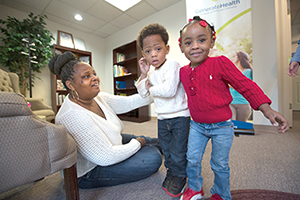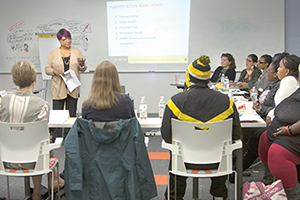SSM Health, Ascension partner in St. Louis effort
By RENEE STOVSKY
They are just three of the 127 zip codes in the St. Louis metropolitan region. 63113. 63120. 63136.
But to St. Louis' Generate Health, a nonprofit regional group promoting better maternal and infant health, they are illustrative of the broader regional crisis of infant mortality — a crisis demarcated by race. Drawing on Missouri Department of Health and Senior Services data from St. Louis City and St. Louis County, Generate Health found that:
- Black babies are three times more likely to die than white babies.
- Black women are nearly 50 percent more likely to have preterm, low-weight babies than any other group, regardless of socioeconomic status.
- Black infants are four times more likely to succumb to sudden infant death syndrome than white babies.
- 20 percent of black women receive inadequate prenatal care, compared to 5 percent of pregnant white mothers.

Rose Pernell and her twins, Khay'den, center, and Khlo'ee Logan, age 2, on a visit to Generate Health's headquarters in St. Louis in the spring. The twins were born prematurely and both spent months in neonatal intensive care. That experience changed Pernell into an advocate for prenatal care and infant health.
Photo by Karen Elshout/© CHA
It often takes more than statistics to understand the human cost of health care failures, however. Which is why, for 11 years now, Jill Thompson, director of strategic initiatives at Generate Health, has been taking local pediatric residents, nurses in training, public health students, board members and occasionally reporters on minivan tours to help them understand the impact of social determinants of health on well-being and parse the systemic, institutional and policy reasons for such inequities.

Thompson
Along the way they see a former hospital, once a huge economic engine in an economically prosperous black community, nationally famous for training African-American physicians. Now it's been repurposed as a senior living facility in an area where the city is the largest landowner — an urban landscape of abandoned homes, refuse-strewn lots and crumbling infrastructure. Playgrounds, day care centers, grocery stores and community health facilities are few and far between.
People on the tours see a huge but mostly deserted industrial park, once filled with automobile factories and corporate headquarters. Nearby is a shuttered U.S. Army Mobility Command facility, with a large tract of land, formerly the location of a munitions plant and now a brownfield riddled with toxic contaminants. Both sites provided area residents with good union jobs that included health care and retirement benefits. Now employment opportunities are few, retail outlets are sparse and bus stops along major corridors are far from pedestrian friendly.
Unequal outcomes
"Despite amazing services for high-risk pregnancies here, including two medical schools with teaching hospitals, St. Louis has the fifth highest infant mortality rate among 53 large cities," says Kendra Copanas, executive director of Generate Health (formerly known as the Maternal, Child and Family Health Coalition). "Maternal and infant health traditionally is addressed with medical advances to keep patients alive" while investments in ways to prevent preterm births and address problems that can complicate pregnancy like hypertension, drug addiction, gestational diabetes and maternal stress lag.
Generate Health works to bring community voices together to set common priorities, advocate for change and bring resources to bear on issues affecting vulnerable mothers and babies. "This is such a complex problem that no one organization can address it by itself. It requires partners, policy and an agenda that can be elevated on public radar," Copanas says.
Ministry involvement
Playing a key role among those community voices, she says, are SSM Health and Ascension, both St. Louis-based systems. "Hospitals recognize that affecting population outcomes is something that requires collaboration. They see this organization as a way to work with other local partners to help meet their missions and objectives to improve health in the community," she says.

Generate Health program director Rose Anderson-Rice leads a discussion with a group of community agency representatives and mothers committed to lowering the high rate of infant mortality in the St. Louis region.
Photo by Karen Elshout/© CHA
While Ascension has no hospitals in the area, it provides money and expertise to Generate Health — Ascension executives serve on the Generate Health board. Susan Kendig, women's health integration specialist with SSM Health St. Mary's Hospital St. Louis, is serving her second stint on the coalition's board. A nurse practitioner and attorney, Kendig was a founding member of Generate Health's board in 1999 and served as the organization's first vice president.
One of Generate Health's priorities has been in the area of maternal mental health, and SSM Health has partnered with it and the Saint Louis Mental Health Board to set up a program to screen new mothers for depression when they bring their babies to the Danis Pediatric Center at SSM Health Cardinal Glennon Children's Hospital in St. Louis.
Kendig says a new mom's mental health directly impacts her baby's health, but many new mothers do not access postpartum visits with their obstetrician — visits where a routine depression screen could flag a cause for concern. "Since most moms, do, however, take their infants to well-baby checkups, we've now initiated protocol to screen for postpartum depression at the pediatric center as well."
Voice of experience
Generate Health, with 12 employees and an annual budget of $1.3 million, also depends on individuals in the community to advocate on behalf of mothers, babies and families.
One of those activists is Rose Pernell, a mother of 10, including 2-year-old twins, daughter Khlo'ee and son Khay'den, preemies who were born at 25 weeks' gestation and spent four and a half and five and a half months, respectively, in a neonatal intensive care unit before coming home.
"I was of the mind that since this was my ninth pregnancy, I didn't have to see a doctor until it was time to go to the hospital and push," says Pernell. "When I started having problems and found out I was going to have twins and I was at risk for preterm labor, everything changed."
Pernell is a member of the Making Change Happen Leadership Academy, an initiative of Generate Health to decrease infant mortality rates. (See sidebar.) These days she gives presentations to pregnant women to stress the importance of prenatal care.
"I show them a poster with pictures of my babies and talk to them about going to doctors' appointments and keeping their health up. We discuss everything from high blood pressure to postpartum depression," she says. "I was so stressed out and worried about my twins. I want (mothers) to know they are not alone, that there's help available."
Toxic stress of racism
Stress is a topic of great interest to another community advocate as well — Rebeccah Bennett, board chair of Generate Health.
Bennett is founder and principal of Emerging Wisdom, a St. Louis-based consulting firm that focuses on personal, organizational and social transformation. A board member of Generate Health, Bennett is also a vegan, a yoga teacher, a wife and a mother to two healthy young
daughters — both of whom were low birth-weight babies.
Bennett first became involved with Generate Health on a professional basis, helping the organization with strategic development.
It was at a board meeting that she first heard Pam Xaverius, a professor at Saint Louis University's College for Public Health and Social Justice, cite statistics showing that "a college-educated African-American woman making $250,000 a year is still twice as likely to lose a baby as a poor white woman with a high school diploma or less, and that the probable cause is 'toxic stress.'"

Rebeccah Bennett, board chair of Generate Health, with her husband, Salim Kenyatta, and their daughters, Willow, who is now 6, at left, and Sage, who is now 3. Bennett says that the unrelenting stress of racism may impact reproductive health outcomes.
"Until then, I had never thought of my own reproductive history — or that of my family — in terms of maternal health and infant mortality. But that data point was about me. My grandmother, my mother and I were all college-educated women, and we all suffered miscarriages and had preterm babies. Not only that, but many of my friends with similar life experiences had similar reproductive outcomes as well," she says.
"I had held a faulty assumption that infant and maternal well-being had to do with the cost of social isolation that comes with poverty, lack of access to medical services and social support — a whole host of stressors," she continues. "But it is much more complicated than that — maybe a story of race more than class. The dynamics of toxic environments, where people experience constant levels of opposition and suspicion based on race, may indeed be social determinants of birth outcomes."
Reframing
Today Bennett says one of her goals is to be transparent about her own story in order to advocate for a "bigger frame" of discussion that disentangles race and class from infants' ability to thrive.
"The social judgment that lies on the backs of poor, black women needs to be called into question," she says. "My focus is to champion research, action and investment in addressing the social determinants of health to improve community outcomes."
Public health officials and social scientists long have equated racial disparity in infant mortality to rates of poverty, lack of access to health care and education, neighborhood safety, and so on, says Copanas.
"We need to address all those issues — and more," she says. "This research shows that institutionalized racism, and the generational impact of stress that it causes, may indeed affect not just life expectancies but birth outcomes as well."
|
'Flourish' program's goal is to reduceinfant mortality
Generation Health's new campaign called "Flourish"works to decrease infant mortality rates by:
- Promoting infant safe-sleep practices through a public information campaign to combat high rates of sudden infant death syndrome.
- Enhancing access to prenatal care for the estimated 35 percent of black women in the city who do not see an obstetrician/gynecologist until their second or third trimester of pregnancy.
- Improving transportation options for pregnant women and new mothers who have trouble navigating inadequate public bus and subway systems or using Medicaid contract vouchers for taxis and shuttles.
- Focusing on mental health issues like depression, stress, substance abuse and addiction before and during pregnancy as well as postpartum.
- Improving access to health information, communication and support systems already in place at doctors' offices and hospitals and through home visits by nurses, coaches and peers.
The initiative is funded by the Missouri Foundation for Health, an independent philanthropic organization.
|
Copyright © 2017 by the Catholic Health Association
of the United States
For reprint permission, contact Betty Crosby or call (314) 253-3490.